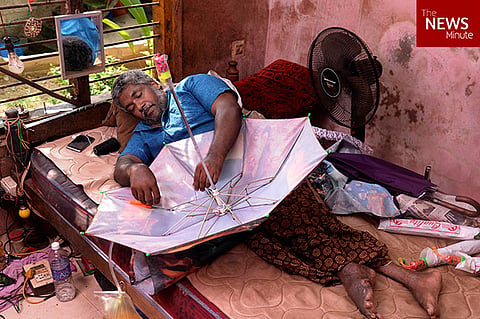

Paralysed as they are, these men and women may not have the pleasure of sinking their feet in wet earth when the monsoon hits Kerala in the coming weeks. But that doesn’t stop them from eagerly looking forward to the coming rains.
After all, as for many others, the coming rains are important to the livelihood of these paralysed umbrella makers spread across the state. Confined to their beds and with few opportunities for a much-needed livelihood, these men and women have turned to Kerala’s famed umbrella-making trade.
Like Musthafa Paramban, a 43-year-old native of Malappuram district, who met with an accident 10 years ago that left his spine damaged. Musthafa worked as a driver, and after the accident just could not fathom what to do with his life. That was when he discovered umbrella making through the palliative care centre he was checked in to. Today, he and his wife make 30 umbrellas a day, and Musthafa’s umbrellas has become something of a small-scale brand name.
Joy
Thaha of Kazhakootam has a similar story to tell. “I learned making umbrellas from a priest in a nearby church. When I became paralysed after falling from a building, I had no means to live. But I was not ready to be a burden on my family, and tried out many things. In five years, I gained confidence and for the last one year I have been making umbrellas professionally. Now we have also formed a small local group where I also teach other differently-abled people to make umbrellas,” says the 45-year-old who has been confined to a wheelchair for the last six years.
For some of these umbrella-makers, the trade came at a time when their lives had reached a desperate level, when no other recourse seemed possible. Sunil of Vadakkancherry, for instance, became paralysed below the waist when he fell from a tree six years ago. However, he was faced with truly dire straits when both his parents passed away a year ago.
“I had no means to live, and we did not have our own house and lived in a rented one. I thought my life had stopped. That is when I heard about umbrella-making and ventured into it,” says Sunil, who has managed to get his life back on a better track thanks to his earnings.
Thaha
It’s not just scattered individuals who are turning to umbrella-making. In many parts of the state, groups and palliative care centres have begun to provide training in the skill on a more organised basis. In Kannur’s Thalassery, for instance, a businessman named Nasar K has begun organising training sessions in umbrella-making for groups of 10 persons with paralysis.
The 44-year-old businessman who became paralysed after falling from the roof of his house. While he himself had no financial troubles thanks to his many businesses, he wanted to extend the same opportunity to others in his situation.
“Since I had a few businesses here, I was able to live even after I met with this accident. But when I went to palliative care centres I found many patients like me, who can’t even move from their bed or chair, and struggle to live. They don’t have any means of livelihood. That is why I organised a local group here and initiated to give training to them in umbrella making,” Nasar says.
However, as Nasar points out, one of the biggest challenges for these umbrella-makers is breaking into the market that is dominated by a handful of very successful brands.
Currently, these men and women sell their products primarily through charity groups and networks of activists associated with palliative care centres. “We mainly target groups who gift umbrellas to school students or other groups of people, and organisations or groups who are interested in buying a bulk order of umbrellas. We do sell some of our umbrellas in shops, but since they are not branded, it’s difficult to get them sold in stores,” explains Musthafa Paramban.
To open up more opportunities and create a bigger market for these umbrella-makers, a few social activists associated with palliative care centres and disability rights groups have come together to create a group called Handicrops, which will leverage social media to build business opportunities. Handicrops not only publicises these local umbrella makers on social media, but also coordinates between them and potential bulk customers.
Photos : Sreekesh Raveendran Nair
Edited by Rakesh Mehar